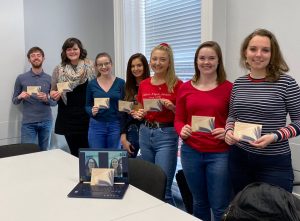‘Enjoy learning French outside the classroom’: tips from Dr Ashleigh Harris (QUB)

This post is part of a series on bridging the gap between secondary and higher education. It is intended for students and teachers from both systems to reflect on how to make the transition smoother.
Dr Ashley Harris is a Lecturer in French Studies at Queen’s University Belfast.
Tell us about your role and what you teach
I am a Lecturer in French Studies at Queen’s University Belfast where I was also a Teaching Assistant during my doctoral studies. I currently teach language and translation across the levels from Beginners’ to Final Year French, as well as leading undergraduate and postgraduate modules on diverse fields of study including migration, contemporary fiction and film, and literary and artistic movements since the nineteenth century. I am also a Schools Liaison Officer so I have the chance to meet prospective students.

What do students enjoy about studying French at university?
Students enjoy a degree in French because it is a highly diverse subject in terms of content and forms of engagement. One class may be dealing with different ways of translating an article or a film script, and the next may be about Caribbean cultures or film noir. The diversity of the degree means we engage with important global themes including gender, health and wellbeing, visual and popular culture, as well as issues pertaining to the broader francophone world. Students like having the opportunity to choose what they study, whether that is through film, history, literature, art, linguistics or a combination. Students are often amazed at how much they develop each year as studying French builds such an employable package of skills in communication, critical thinking and diplomacy, amongst others.
What is different between studying French in Sixth Form and in university?
There are many positive differences. For one, students take learning into their own hands in terms of time and project-management, and can discuss their individual development goals with their own dedicated personal tutor. Secondly, university is where there is not a one-size-fits-all answer to learn by heart and that surprises students at first. For example, we provide multiple versions of translation fair copies and multiple perspectives can be graded highly in response to the more abstract discussions required in the cultural modules. Both of these aspects require some adjustment but they are highly empowering.

What is the biggest challenge for first year students?
Students need to take chances in a new context whether that is speaking in French in front of the class or striking up a conversation with a fellow Fresher or a francophone Erasmus student. Doing so is the best way gain confidence, resilience, and ouverture d’esprit, all of which are important for the year abroad. We dedicate time to adapting resources to meet first-year students where they are, ensuring the topics that we cover are engaging and relevant. We recently revamped our language modules to include enjoyable and vocational activities like film script translations, press briefings, summary documents, blog posts, CVs and cover letters.
Any tips or recommendations for students who would like to study French or for teachers on how to prepare them?
Be happy making mistakes to learn, it is all part of the process. Enjoy learning French outside of the classroom whether that means watching Netflix, listening to podcasts, practising vocabulary on Duolingo or going on holiday! Students and teachers can appreciate the fact that French isn’t just grammar but is made of a rich heritage of film, literature, philosophy and history and is key to gaining opportunities for travel, international friendships, and work in domains including journalism, marketing, interpreting, international business, civil service and diplomacy.
